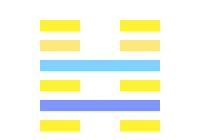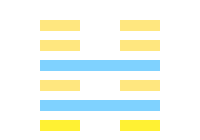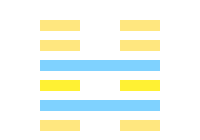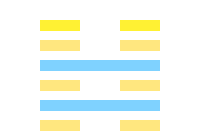40.1.2.3.6 (40 > 30)

40.1.2.3.6 (40 > 30) - THE KIEH HEXAGRAM.
- 1. The first line, divided, shows that its subject will commit no error.
- 2. The second line, undivided, shows its subject catch, in hunting, three foxes, and obtain the yellow ( = golden) arrows. With firm correctness there will be good fortune.
- 3. The third line, divided, shows a porter with his burden, (yet) riding in a carriage. He will (only) tempt robbers to attack him. However firm and correct he may (try to) be, there will be cause for regret.
- 6. In the sixth line, divided, we see a feudal prince (with his bow) shooting at a falcon on the top of a high wall, and hitting it. (The effect of his action) will be in every way advantageous.
40.1.2.3.6 (40 > 30) - Getting on with the job
One respects the will of one's superiors by not taking their decisions lightly.
Bing DeepL Google Yandex40.1.2.3.6 (40 > 30) - Getting on with the job
One respects the will of one's superiors by not taking their decisions lightly.
Bing DeepL Google Yandex40.1.2.3.6 (40 > 30) - Kieh, la libération
Kieh : 1. Délivrer, faire échapper, échapper au danger ; 2. Disperser ; 3. Ouvrir, séparer, s’ouvrir. Se dit du mouvement de la germination. 4. Résoudre une difficulté, une complication.
-
1. Délivrer quelqu’un est chose excellente.
Quand le fort et le faible s’entendent selon la justice, il n’y a pas de faute à craindre. - 2. Délivrer est aussi heureux que, pour le chasseur, prendre trois renards et obtenir le prix, la flèche d’or. — Celui qui résout une difficulté, fait sortir d’une position difficile, est comme le chasseur qui prend trois renards et obtient la flèche d’or.
-
3. Si un porteur se met dans un char et qu’il survienne des voleurs, il sera attaqué et échappera difficilement ; s’il abandonne sa charge, il pourra se sauver.
Pour un porteur, aller en char est honteux ; c’est attirer sur soi les voleurs.
Il n’appartient pas à des gens du commun d’aller en char . - 6. Si le prince est assez habile pour atteindre d’une flèche un faucon posé sur le haut d’un mur élevé, il aura le succès et saura disperser les rebelles.
40.1.2.3.6 (40 > 30) - S'atteler à la tâche
On respecte la volonté de ses supérieurs en ne prenant pas leurs décisions à la légère.
Bing DeepL Google Yandex40.1.2.3.6 (40 > 30) - Módosítás
- 1. Fel akarja szabadítani magát, ez egy jó döntés.
- 2. Megkérik hogy válaszokat keressen mielőtt túl késő.
- 3. Ha valaki elhanyagolja, másoknak adja.
- 6. Miután felkészül, meg tudja oldani a problémákat időben.
The trigrams
The trigrams are combinations of three yin and yang lines. The three bottom lines of the hexagram form the lower trigram and represent the inner situation. The three top lines form the upper trigram and represent the outer situation.
Upper trigram: The thunder The fire


Lower trigram: The water The fire


The formation: 40
What is already there

40 - THE KIEH HEXAGRAM.
In (the state indicated by) Kieh advantage will be found in the south-west. If no (further) operations be called for, there will be good fortune in coming back(to the old conditions). If some operations be called for, there will be good fortune in the early conducting of them.
Bing DeepL Google Yandex40 - Kieh, la libération
Kieh : 1. Délivrer, faire échapper, échapper au danger ; 2. Disperser ; 3. Ouvrir, séparer, s’ouvrir. Se dit du mouvement de la germination. 4. Résoudre une difficulté, une complication.
Texte et commentaire
Si l’on réussit à faire échapper aux dangers, on gagnera les gens à soi et l’on aura des relations heureuses ; on gardera le milieu. En tout ce que l’on fait, l’activité est chose utile et fait acquérir des mérites. Kieh est : se trouvant en danger, savoir agir et échapper. Quand le ciel et la terre ouvrent les pores (3e sens) des êtres, le tonnerre et la pluie se produisent. Alors les plantes et les arbres à fruit bourgeonnent. Bien important est le temps où tout s’ouvre.
Symbolisme
Le tonnerre et la pluie forment le Koua Kieh. Le sage est indulgent pour l’erreur et traite les coupables avec douceur.

40.1 (40 > 54) - THE KIEH HEXAGRAM.
The first line, divided, shows that its subject will commit no error.
Bing DeepL Google Yandex40.1 (40 > 54) - Wanting to lose one's constraints
One wants to free oneself, it is a good decision.
Bing DeepL Google Yandex40.1 (40 > 54) - Wanting to lose one's constraints
One wants to free oneself, it is a good decision.
Bing DeepL Google Yandex40.1 (40 > 54) - Kieh, la libération
Kieh : 1. Délivrer, faire échapper, échapper au danger ; 2. Disperser ; 3. Ouvrir, séparer, s’ouvrir. Se dit du mouvement de la germination. 4. Résoudre une difficulté, une complication.
Délivrer quelqu’un est chose excellente.
Quand le fort et le faible s’entendent selon la justice, il n’y a pas de faute à craindre.
40.1 (40 > 54) - Vouloir perdre ses contraintes
On veut se libérer, c'est une bonne décision.
Bing DeepL Google Yandex
40.2 (40 > 16) - THE KIEH HEXAGRAM.
The second line, undivided, shows its subject catch, in hunting, three foxes, and obtain the yellow ( = golden) arrows. With firm correctness there will be good fortune.
Bing DeepL Google Yandex40.2 (40 > 16) - Defending one's rights
One is asked to find the answers before it is too late.
Bing DeepL Google Yandex40.2 (40 > 16) - Defending one's rights
One is asked to find the answers before it is too late.
Bing DeepL Google Yandex40.2 (40 > 16) - Kieh, la libération
Kieh : 1. Délivrer, faire échapper, échapper au danger ; 2. Disperser ; 3. Ouvrir, séparer, s’ouvrir. Se dit du mouvement de la germination. 4. Résoudre une difficulté, une complication.
Délivrer est aussi heureux que, pour le chasseur, prendre trois renards et obtenir le prix, la flèche d’or. — Celui qui résout une difficulté, fait sortir d’une position difficile, est comme le chasseur qui prend trois renards et obtient la flèche d’or.
Bing DeepL Google Yandex40.2 (40 > 16) - Défendre ses droits
On nous demande de trouver les réponses avant qu'il ne soit trop tard.
Bing DeepL Google Yandex40.2 (40 > 16) - Módosítás
Megkérik hogy válaszokat keressen mielőtt túl késő.
Bing DeepL Google Yandex
40.3 (40 > 32) - THE KIEH HEXAGRAM.
The third line, divided, shows a porter with his burden, (yet) riding in a carriage. He will (only) tempt robbers to attack him. However firm and correct he may (try to) be, there will be cause for regret.
Bing DeepL Google Yandex40.3 (40 > 32) - Forgiving slight mistakes
When one neglects, one gives to others.
Bing DeepL Google Yandex40.3 (40 > 32) - Forgiving slight mistakes
When one neglects, one gives to others.
Bing DeepL Google Yandex40.3 (40 > 32) - Kieh, la libération
Kieh : 1. Délivrer, faire échapper, échapper au danger ; 2. Disperser ; 3. Ouvrir, séparer, s’ouvrir. Se dit du mouvement de la germination. 4. Résoudre une difficulté, une complication.
Si un porteur se met dans un char et qu’il survienne des voleurs, il sera attaqué et échappera difficilement ; s’il abandonne sa charge, il pourra se sauver.
Pour un porteur, aller en char est honteux ; c’est attirer sur soi les voleurs.
Il n’appartient pas à des gens du commun d’aller en char .
40.3 (40 > 32) - Pardonner les fautes légères
Quand on néglige on donne aux autres.
Bing DeepL Google Yandex
40.6 (40 > 64) - THE KIEH HEXAGRAM.
In the sixth line, divided, we see a feudal prince (with his bow) shooting at a falcon on the top of a high wall, and hitting it. (The effect of his action) will be in every way advantageous.
Bing DeepL Google Yandex40.6 (40 > 64) - Unlocking the situation
Once prepared, one can solve problems in time.
Bing DeepL Google Yandex40.6 (40 > 64) - Unlocking the situation
Once prepared, one can solve problems in time.
Bing DeepL Google Yandex40.6 (40 > 64) - Kieh, la libération
Kieh : 1. Délivrer, faire échapper, échapper au danger ; 2. Disperser ; 3. Ouvrir, séparer, s’ouvrir. Se dit du mouvement de la germination. 4. Résoudre une difficulté, une complication.
Si le prince est assez habile pour atteindre d’une flèche un faucon posé sur le haut d’un mur élevé, il aura le succès et saura disperser les rebelles.
Bing DeepL Google Yandex40.6 (40 > 64) - Débloquer la situation
Après s'être préparé, on peut résoudre les problèmes à temps.
Bing DeepL Google Yandex40.6 (40 > 64) - Módosítás
Miután felkészül, meg tudja oldani a problémákat időben.
Bing DeepL Google YandexIn the making: 30
What is poised to happen

30 - THE LÎ HEXAGRAM.
Lî indicates that, (in regard to what it denotes), it will be advantageous to be firm and correct, and that thus there will be free course and success. Let (its subject) also nourish (a docility like that of) the cow, and there will be good fortune.
Bing DeepL Google Yandex30 - Lî, le feu
Lī : éclat, brillant, bel extérieur, succès.
Texte
Beauté, « bel extérieur », se développe et s’achève comme dans l’élevage d’un animal domestique (qui, bien soigné, est gras, beau, luisant).
Symbolisme
La lumière du soleil doublée (en dessus et en dessous) forme le Koua. Le grand homme fait ainsi briller ses qualités de plus en plus dans les quatre régions.
Commentaire
Le soleil et la lune brillent dans le ciel ; les grains, les plantes brillent sur la terre. Un double éclat brille dans tout ce qui est droit et juste et transforme, en le perfectionnant, tout ce qui existe ici-bas.
The nuclear hexagram: 63.1.2.4 (63 > 28)
The nuclear hexagram is the association of the two inner trigrams (lines 2,3,4 and 3,4,5). It represents the root, or the origin of the situation.

63.1.2.4 (63 > 28) - THE KÎ 3Î HEXAGRAM.
- 1. The first line, undivided, (shows its subject as a driver) who drags back his wheel, (or as a fox) which has wet his tail. There will be no error.
- 2. The second line, divided, (shows its subject as) a wife who has lost her (carriage-)screen. There is no occasion to go in pursuit of it. In seven days she will find it.
- 4. The fourth line, divided, shows its subject with rags provided against any leak (in his boat), and on his guard all day long.
63.1.2.4 (63 > 28) - Maximum
One loses one's dignity by abandoning one's mission.
Bing DeepL Google Yandex63.1.2.4 (63 > 28) - Maximum
One loses one's dignity by abandoning one's mission.
Bing DeepL Google Yandex63.1.2.4 (63 > 28) - Tchi tzi, ce qui suit l’achèvement
Tchi-tzi : traversée achevée, achèvement, succès, moyen d’achever, compléter.
- 1. Traversée achevée comme celle de quelqu’un qui, ayant fini son voyage, reprend les roues de son char, ou d’un renard qui, tout en traversant une rivière, a mouillé sa queue complètement.
-
2. Voyage fini (interrompu), comme d’une femme qui, ayant perdu le voile de son char (Keū tchi pi, tenture qui entourait le char et cachait la personne qui le montait. Sans ce voile, une femme vertueuse ne pouvait voyager. Son voyage était donc fini jusqu’à ce qu’elle le retrouve et elle ne pouvait aller à découvert pour le chercher) ne peut le chercher, mais le retrouve seulement après quelques (sept) jours.
Elle agit ainsi parce qu’elle suit la voie de la sagesse. -
4. Lorsque les bords, les franges d’un habit se mouillent, il faut être sur ses gardes jusqu’au bout de la traversée (ou bien : lorsqu’en bateau on est obligé d’employer les bords de ses habits pour boucher les trous, etc.).
Il y a lieu de craindre alors.
63.1.2.4 (63 > 28) - Le maximum
On perd sa dignité en abandonnant sa mission.
Bing DeepL Google Yandex63.1.2.4 (63 > 28) - Maximum
- 1. Kéri a közelállókat hogy készüljenek fel mielőtt válaszolnak.
- 2. Nem kér bizalmat de megkapja a javítások révén.
- 4. Ha valaki nem várt nehézségbe ütközik, siessen ellenőrizni.
Ruler
The starting situation

40.6 (40 > 64) - THE KIEH HEXAGRAM.
In the sixth line, divided, we see a feudal prince (with his bow) shooting at a falcon on the top of a high wall, and hitting it. (The effect of his action) will be in every way advantageous.
Bing DeepL Google Yandex40.6 (40 > 64) - Unlocking the situation
Once prepared, one can solve problems in time.
Bing DeepL Google Yandex40.6 (40 > 64) - Unlocking the situation
Once prepared, one can solve problems in time.
Bing DeepL Google Yandex40.6 (40 > 64) - Kieh, la libération
Kieh : 1. Délivrer, faire échapper, échapper au danger ; 2. Disperser ; 3. Ouvrir, séparer, s’ouvrir. Se dit du mouvement de la germination. 4. Résoudre une difficulté, une complication.
Si le prince est assez habile pour atteindre d’une flèche un faucon posé sur le haut d’un mur élevé, il aura le succès et saura disperser les rebelles.
Bing DeepL Google Yandex40.6 (40 > 64) - Débloquer la situation
Après s'être préparé, on peut résoudre les problèmes à temps.
Bing DeepL Google Yandex40.6 (40 > 64) - Módosítás
Miután felkészül, meg tudja oldani a problémákat időben.
Bing DeepL Google YandexCorrection
The direction where the ruler is going to bend

40.1.2.3 (40 > 55) - THE KIEH HEXAGRAM.
- 1. The first line, divided, shows that its subject will commit no error.
- 2. The second line, undivided, shows its subject catch, in hunting, three foxes, and obtain the yellow ( = golden) arrows. With firm correctness there will be good fortune.
- 3. The third line, divided, shows a porter with his burden, (yet) riding in a carriage. He will (only) tempt robbers to attack him. However firm and correct he may (try to) be, there will be cause for regret.
40.1.2.3 (40 > 55) - Building one's reputation
One plans a stunt without anyone else being informed.
Bing DeepL Google Yandex40.1.2.3 (40 > 55) - Building one's reputation
One plans a stunt without anyone else being informed.
Bing DeepL Google Yandex40.1.2.3 (40 > 55) - Kieh, la libération
Kieh : 1. Délivrer, faire échapper, échapper au danger ; 2. Disperser ; 3. Ouvrir, séparer, s’ouvrir. Se dit du mouvement de la germination. 4. Résoudre une difficulté, une complication.
-
1. Délivrer quelqu’un est chose excellente.
Quand le fort et le faible s’entendent selon la justice, il n’y a pas de faute à craindre. - 2. Délivrer est aussi heureux que, pour le chasseur, prendre trois renards et obtenir le prix, la flèche d’or. — Celui qui résout une difficulté, fait sortir d’une position difficile, est comme le chasseur qui prend trois renards et obtient la flèche d’or.
-
3. Si un porteur se met dans un char et qu’il survienne des voleurs, il sera attaqué et échappera difficilement ; s’il abandonne sa charge, il pourra se sauver.
Pour un porteur, aller en char est honteux ; c’est attirer sur soi les voleurs.
Il n’appartient pas à des gens du commun d’aller en char .
40.1.2.3 (40 > 55) - Construire sa renommée
On trame un coup d'éclat sans que les autres ne soient prévenus.
Bing DeepL Google Yandex40.1.2.3 (40 > 55) - Módosítás
- 1. Fel akarja szabadítani magát, ez egy jó döntés.
- 2. Megkérik hogy válaszokat keressen mielőtt túl késő.
- 3. Ha valaki elhanyagolja, másoknak adja.

